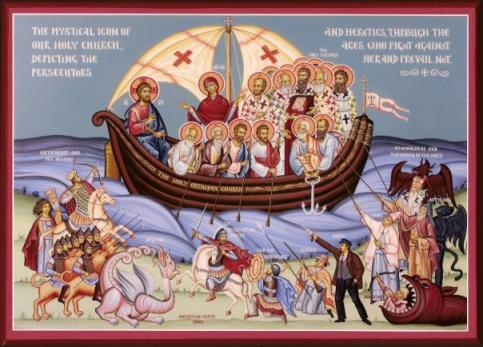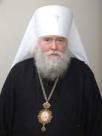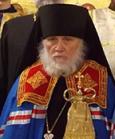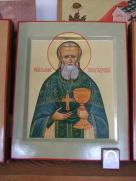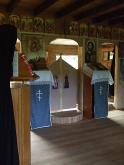Sunday, July 27, 2014
Sermon on the Sunday of the first Six Ecumenical Councils
ORTHODOXY means “right glorification” (of God), correct faith. The correct faith, as defined by the Holy Church - that faith defines how we believe.
The essence of Orthodoxy is NOT things like having gold cupolas, having an iconostasis, having no church seats…! These things are part of Church tradition, and may assist our faith, but they have had various forms in various times and places.
The correct faith was defined at the seven Ecumenical Councils. These gatherings of Bishops discussed and condemned certain teachings which were disturbing Christians at various times in history. These non-Orthodox teachings are called heresies. A heresy is an ERROR in faith, or an incorrect teaching.
These Ecumenical Councils defined the basics tenets (called dogmas) of the Orthodox faith.
In addition to the Councils, the Orthodox faith is informed by the Holy Scriptures (the Bible) and the Church Tradition as taught and lived by the Holy Fathers of the Church.
1. In the 4th century, 300 bishops met and refuted Heresy of Arius against the Son of God.
The Arians believed that Son of God is created, that is, that he is a man and not truly God. They believed that Jesus Christ is NOT equal with God the Father.
It is interesting to note that many modern protestants see Jesus Christ in a similar way to the Arians – as a great moral teacher, a good man, or their personal friend. The manner of addressing God is coloured by this perception of Christ as “one of us, a man”.
Many later Christian Groups, such as MORMONS, the “Church of God”, and Jehovas Witnesses, hold more or less Arian views of our Lord Jesus Christ.
We Orthodox, in contrast, believe that Jesus Christ truly is God AND man.
2. Once again, in the 4th century, 150 bishops met and refuted the heresy of Macedonius against God the Holy Spirit.
The Macedonians believed that the Holy Spirit is NOT equal with God the Father.
This council also reaffirmed the Creed of Faith, which Orthodox Christians recite every day.
It is interesting to note that many years later, the Roman Catholic church changed the Creed of Faith precisely in its explanation of the Holy Spirit. Instead of teaching that the Holy Spirit proceeds from the Father, the Roman Catholic church teaches that the Holy Spirit proceeds from the Father AND the Son – in essence, making the Holy Spirit lower than the Father and the Son.
In contrast, we Orthodox believe that the Holy Spirit is equal with the Father and the Son.
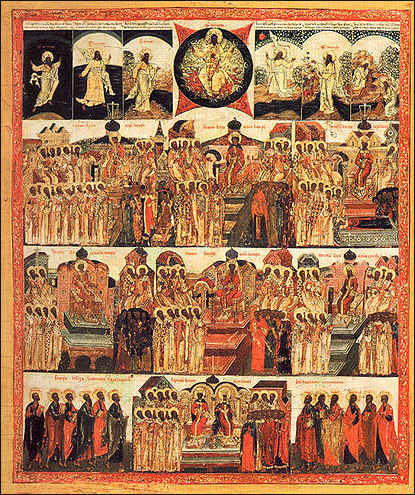
3. In the 5th century, 200 bishops met and refuted the heresy of Nestorius against the Mother of God.
The Nestorians believed that the Holy Virgin Mary should not be called “Theotokos”, but rather, only “Christotokos” – that is, birthgiver of Christ, but not of God. This teaching makes it unclear whether Jesus Christ, from the moment of conception, really was God!
From the beginning of the protestant faiths, they have been reluctant to give the honour of the name “Birthgiver of God” to the Most-Holy Virgin. Many protestants do not believe that the Virgin Mary remained a Virgin before, during, and after childbirth.
In contrast, the Orthodox faith teaches that the Most-Holy Virgin is holier than all the saints, because she fully contained within Herself and gave birth to – GOD the SON!
4. In the 5th century, 600 bishops refuted the monophysite heresy.
The monophysites believed Christ had only ONE nature – the DIVINE nature. They believed His human nature was absorbed in His Divine nature.
To this days, the Coptic “Orthodox”, Syrian “Orthodox”, and Armenian “Orthodox” have not renounced this belief.
The Orthodox believe that Christ had two natures, both Divine and human – otherwise, it would follow that the divine nature suffered on the Cross – something which is not possible for the unchangeable God.
5. In the 6th century, 160 bishops refuted the heresy of Origen.
This belief holds that ‘everyone is saved’ or ultimate universal salvation, regardless of faith and life. It is a very MODERN VIEW of faith, which we encounter every day in the modern society we live in.
The Orthodox faith is very different from this modern indifference – it requires a specific faith, and a specific practice, and sincere repentance wherever a person falls short of the ideal
6. In the 7th century, 170 bishops refuted the monothelite heresy.
The monothelites believed that Christ had ONLY one will - the Divine Will (NOT 2 wills as in Orthodoxy). The famous Saint MAXIMOS the Confessor suffered much, and finally had his tongue cut out because of his stance against this heresy. St Maximos was a simple monk, who taught the correct faith, acting against Emperors, Patriarchs, and Bishops who had accepted the non-Orthodox belief. As he was not even a priest, but only a simple monk, he is an example of what courage, firmness, and knowledge every lay person should have in keeping the Orthodox faith.
7. In the 8th century, 360 bishops met and refuted iconoclasm.
The iconoclasts believed we should not make icons of Christ, the Mother of God, or the saints. This heresy disturbed the Church from more than a hundred years. There were martyrs for the icons, icons were destroyed, and the whole Byzantine empire was implicated.
ALL these Heresies produced thousands of martyrs. Orthodox faithful were killed for refusing to accept these new distorted and altered forms of faith. To this day the TRUE Orthodox Church believes that these Church Councils, through the operation of the Holy Spirit condemned and judged these Heresies, and the ORTHODOX FAITH was defined and confirmed for all time.
YOU are not Orthodox unless you believe according to the Holy Ecumenical Councils. But this is not all – you must also make sure your Bishop believes according to the Seven Ecumenical Councils. This is because the BISHOP is the head of the local Church. How the Bishop BELIEVES is how the Church BELIEVES.
According to the LAWS (the Canons) of the 7 Ecumenical Councils:
1. An Orthodox Christian cannot leave his bishop….EXCEPT if the Bishop is in heresy.
2. An Orthodox MUST, or is obliged to leave his Bishop if he is in heresy.
On this basis people like us left ROCOR(MP) in 2007 when it joined the Moscow Patriarchate (MP), because this organisation fully participates in the World Council of Churches (WCC), and through it, in ECUMENISM – a teaching which has been defined by Church fathers as heresy of heresies.
All the ‘mainstream’ Orthodox bishops who participate in the WCC, and the Churches they represent, do not truly follow the decisions, Canons, ands Laws of the seven Ecumenical Councils. They have signed documents to be ONE with the very heretics condemned by these Councils!
For example, well-known bishops (even patriarchs!) publicly pray with not only Monophysites and Catholics, but also with pagans and Jews. Prayer together with people who believe entirely differently is not allowed for Orthodox people. Therefore, such hierarchs have put themselves outside the Orthodox Church - and no sincere Christian can follow them.
Roman Catholics recognise another 20 Councils as Ecumenical. One of their most recent councils teaches that the Pope of Rome, when he speaks ‘ex cathedra’ is sinless. As mentioned above, they also changed the Symbol of Faith from the 2nd Ecumenical Council.
Protestants and later Christian Sects descended from the Protestants do not acknowledge ANY Ecumenical Councils. This is interesting because the composition of books in Holy Scripture (which they regard as their sole source of authority) was finally decided only in the 6 Century, at the 6th Ecumenical Council (!)
Many of the Heresies of the first Centuries were widespread, lasted a long time, and caused tremendous disruption in Church and political life, with great loss of innocent life. ‘Everyone’ was a heretic. The vast majority of people were in the glorious big churches. The true Orthodox were suffering, persecuted and often tortured and killed, by people who a short while before attended the same church as them!!
The True Orthodox had to gather in Catacombs, and make-do churches anywhere they could.
There is nothing new about the majority being in heresy, and this majority persecuting the few faithful people.
In our times what is most dangerous for us is the entry of Orthodox Churches into the ecumenical movement. This means their acceptance of a Protestant ecumenical understanding of the Church. Such an understanding in reality is already spoken of at meetings and printed in the books of Orthodox ecumenists. Together with the breakdown of an authentic Orthodox understanding of the Church we find an undermining of the meaning of the Ecumenical Councils which means a consequent loss in the firmness of the Council’s dogmas. As a result, the very foundation of Orthodoxy is undermined. ( Protopresbyter Michael Pomazansky. From Orthodox Life, No.1, 1989.)
However, we must understand that the heretic, non-Orthodox Christians are not necessarily “bad people” – but they are not Orthodox. They are not in God’s Church.
We should pray for them and feel sorry for them – bring them to Orthodoxy, by our example faith and life. Those who have left the Orthodox Church, or who entertain non-Orthodox teachings while still outwardly appearing to be “orthodox” are the poorest of the poor – for they have lost their salvation through the Holy Orthodox Church!
Dear brothers and sisters…..we must RUN to the MOTHER OF GOD for help, as the Orthodox Christians always have done.
She will protect, guide and help us. She is our help and Protectress.
Incorrect belief and distortion of Orthodox faith (as defined by the seven Ecumenical Councils), is a spiritual sickness. People who have stopped running to the Mother of God for guidance and help …..eventually end up in incorrect belief, or even no belief or faith. Some even start persecuting the true faith.
Let us pray especially for the younger generations, our children, and their children who will need even more help to survive in our increasingly antichristian world. Amen.
